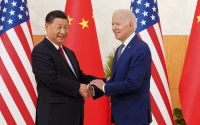A single day's news cycle is an exercise in cognitive dissonance. On Monday, we were served a chaotic platter of unrelated crises. A former U.S. President is petitioning the Supreme Court over an $88 million defamation judgment. A Russian energy behemoth, Lukoil, is effectively being dismantled in real-time by U.S. sanctions, its $20 billion in overseas assets now in jeopardy. And three Chinese astronauts are stranded in orbit, their return vessel potentially compromised by space debris.
It's tempting to process these as distinct, isolated events—silos of chaos in a perpetually turbulent world. One is a legal drama, another a geopolitical power play, the third a technical failure in the hostile vacuum of space. But that's a surface-level reading. My analysis suggests these aren't separate stories at all. They are three distinct data points illustrating the same alarming trend: the profound and growing fragility of our most critical global systems.
The Weaponization of a Ledger
Let’s start with the clearest signal: Lukoil. The Russian oil giant didn't have its tankers seized or its fields nationalized by force. It was kneecapped by a series of keystrokes originating in Washington D.C. The company has a 75% stake in Iraq's West Qurna-2 field, a project that pumps over 400,000 barrels of crude a day. Yet, the Iraqi government has been forced to halt payments and declare it can no longer work with its primary partner. Why? Because the U.S. Treasury sanctioned Lukoil, making it radioactive to any entity that wants to participate in the global financial system (Russian oil firm’s multibillion-dollar assets overseas at risk as US sanctions begin to bite).
This isn't a conventional blockade. It's something far more clinical and potent. Think of the global economy as a biological organism. The oil, the assets, the refineries—that's the muscle and bone. But the SWIFT transaction system is the circulatory system, and the U.S. dollar is the blood. By sanctioning Lukoil, the Treasury Department didn't just target a limb; it injected a coagulant straight into the heart. The company can’t pay its Iraqi employees. Its Finnish subsidiary, Teboil, is running out of fuel. A planned sale of its international assets to the Swiss-based trader Gunvor was scuttled not by a complex negotiation, but by a blunt post on X from the Treasury stating it would "never" get a license.
I've looked at hundreds of corporate filings, and a force majeure declaration is typically reserved for natural disasters or wars—uncontrollable physical events. Here, the "act of God" was a line of code in a Treasury Department database. This is a chillingly efficient demonstration of centralized power. What does it mean when a single government entity can, with minimal physical effort, functionally paralyze a multinational corporation with assets exceeding the GDP of a small nation? And how many other global firms are just one political decision away from having their own circulatory systems shut down?
When Precedent Becomes Gravity
The same theme of systemic stress, albeit playing out on a different timeline, is visible in Donald Trump’s appeal to the Supreme Court (Trump asks Supreme Court to overturn verdict that he sexually abused and defamed E. Jean Carroll). Stripping away the political noise, this is a test of the legal system's integrity and its ability to enforce its own rules, even against the most powerful individuals. The numbers here are consequential: first a $5 million judgment for sexual abuse and defamation, then a staggering $83.3 million penalty—to be more exact, it was $83.3 million—for repeating the defamatory statements. These aren’t just fines; they are numerical expressions of accountability, calibrated to be inescapable.

Trump’s legal team is arguing procedural errors and, more fundamentally, a form of presidential immunity. The core question isn't really about E. Jean Carroll anymore. It's about whether the legal framework has the structural integrity to hold a former commander-in-chief to the same civil standards as anyone else. The fact that the Justice Department has filed a brief on the narrow question of whether presidential immunity can be waived (a subtle but critical distinction) shows that the system itself is grappling with its own boundaries.
Unlike the instantaneous financial shock to Lukoil, the legal process is a slow, grinding mechanism. It’s a system built on precedent, where each decision adds a layer of gravitational pull to the next. The lower courts have held firm, reinforcing the initial verdict. Now, the case is a petition before the highest court. The outcome is less important than what the process reveals. It shows a system under immense strain, being forced to define its own non-negotiable principles. Will the rule of law prove to be an immutable force, like gravity, or will it be shown to have escape velocities for the powerful?
The Tipping Point at 17,000 MPH
If the Lukoil case is about the fragility of man-made financial networks and the Trump case is about our legal ones, the plight of the three Chinese astronauts is a stark reminder of the fragility of our physical environment. They are stuck in orbit because their return ship may have been hit by debris. This isn't a dramatic Hollywood explosion; it’s a failure mode born of decades of slow, cumulative, and unmanaged pollution.
For over 60 years, every rocket launch has left behind a ghost: spent stages, flecks of paint, discarded satellites. This has created a lethal, high-velocity junkyard in low-Earth orbit. The system has become a danger to itself. A single, untraceable object moving at 17,000 miles per hour can cause a catastrophic failure, grounding a multi-billion dollar space program and stranding human beings hundreds of miles from home.
This is the ultimate externality problem. We can sanction a company for its actions. We can hold an individual liable for their words. But who is responsible for a systemic failure that has been building for half a century, created by dozens of nations and corporations, most of whom are no longer in business? The astronauts' predicament is a quiet, terrifying signal that we may be crossing a tipping point in our ability to safely operate in orbit. It's a system that is slowly, but surely, breaking itself.
These Are Not Unrelated Data Points
Viewed in isolation, Monday's headlines are just noise. But when you plot them on the same chart, a clear pattern emerges. These events are tremors radiating from the same fault line: the brittleness of the complex, interconnected systems that govern our world. Whether it's the global financial order, the rule of law, or the physical environment of space, these systems are proving to be far less resilient than we assume. They are vulnerable to single points of failure, be it a Treasury directive, a court ruling, or a stray piece of metal. The real story isn't about the individual actors; it's about the instability of the stage on which they're playing.










